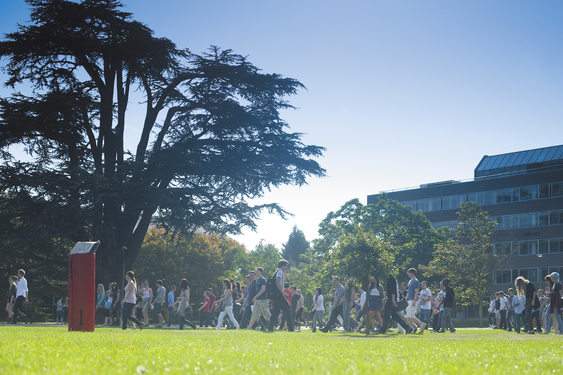
Excellence
As an institution that strives for excellence in the pursuit of learning, we believe that students should be expected to engage with ideas and perspectives that are new to them. A university education should open students’ minds to different ways of thinking, not simply reinforce prior assumptions. An open and inclusive approach to teaching, therefore, is necessary for educational excellence.
Our inclusive approach means that we care about educational progress and student outcomes for students from all diverse backgrounds. This is something which is built into our institutional policies and targets:
An objective of the 20/21-24/25 Access and Participation Plan is to “Ensure that under-represented students who begin their studies at UoR remain on course and complete their studies”.[1] The plan furthermore commits us to closing the degree awarding gaps for disability, race and sex. This is an institutional priority that requires collective action, and which is overseen by a dedicated steering group. Our performance against these metrics is monitored closely by the Office for Students, and forms an important part of the TEF process.
Recommendation 10 from the UoR 2021 Race Equality Review requires development of a programme to decolonise the curriculum. The Decolonising the Curriculum working group is tasked with creating an institutional vision for decolonising the curriculum and creating resources to support colleagues in this process.
Community
Reading has more than 20,000 students from diverse backgrounds (including 5000 international students from over 140 countries). Our inclusive approach promotes the opportunity to learn within a culturally diverse community in which everyone can feel a sense of belonging.
Students and staff need to feel that they can bring their whole selves to their study and work, and that their identities enrich our community. They should feel that they are valued, equal, and able to participate and contribute fully to the academic life of the institution. This enhances everyone’s University experience.
We also recognise the importance of the mental health and wellbeing of students and staff and are working towards recognition under the University Mental Health Charter Award. An inclusive, stigma-free learning environment contributes to a positive culture in which individual and community wellbeing thrives.
Engaged University
Our university is located within an economically vibrant and socially diverse community. As an institution which attracts students and staff from around the world, we play an important part in nurturing and sustaining this diversity, which does so much to enrich the cultural fabric of the local community.
To enhance the positive social and economic impact that the University makes within our local region, it is important that our staff and students broadly reflect the social makeup of our community. If we are to extend the career aspirations and outcomes of local people, and help develop the skills and knowledge required by locally-based employers, we need to ensure that we are able to cultivate and develop the talents of learners from a wide variety of backgrounds.
Sustainability
We recognise that providing high quality teaching and support for an increasingly diverse community does require a commitment of resource. However, our inclusion by design approach, as enshrined in our Curriculum Framework, minimizes the need for ad hoc or exceptional support services. By providing inclusive teaching and learning for all, we aim to embed efficient and sustainable practices that reduce the complexity and cost of our student support arrangements. Since 2016, for example, allocation of the Disabled Students Allowance which paid for support has changed considerably. As a result of funding cuts the onus is now on universities to make their learning provision more inclusive generally.
At the most fundamental level, institutions cannot be sustainable if they fall short of meeting their legal obligations. The Equality Act (2010) is the legal framework that provides protection from discrimination and makes it potentially unlawful to discriminate in relation to protected characteristics. The University is also subject to the Public Sector Equality Duty which requires us to have due regard to the need to eliminate discrimination, advance equality of opportunity and foster good relations between different people when carrying out their activities.
[1] For the purposes of widening access to higher education, we consider underrepresented groups to include: students from areas of low higher education participation, low household income or low socioeconomic status; black, Asian and minority ethnic students; mature students; disabled students; care leavers; carers; people estranged from their families; people from Gypsy, Roma and Traveller communities; refugees; children from military families.